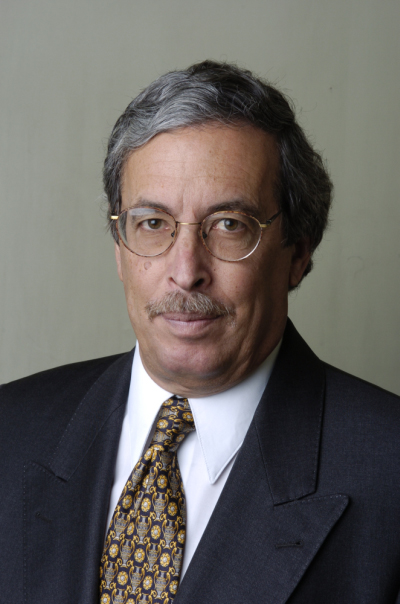
Covid-19: Health or wealth?
Can the pandemic be separated from the economy? Columnist Daniel Warner writes that as the pandemic grows in Europe and the United States, this and other important questions are being raised.
The medical necessity of social distancing and staying home has had dire consequences for the global economy. Consumers are not spending. Many companies are closing or limiting activities. Employees are being laid off or given partial compensation. The self-employed often have no place to turn.

What should governments do? Should they allow businesses to open? Obviously businesses that provide essentials such as food and its distribution, as well as all that relates to medical services, should function, although one can certainly question why President Trump has not nationalized the manufacture of masks, respirators and other medical necessities. If fighting the virus is equivalent to fighting a war, as French President Macron said, then the manufacture of masks and ventilators should be front and center as was the manufacture of tanks and bombers during World War II.
The pandemic has also revealed inherent problems in federal systems. Contradicting orders coming from the national and regional levels of governments have shown a lack of centralized power.

More
How the virus puts the Swiss political system to test
Swiss cantons have given different instructions to their citizens. As much as the Federal Council (executive body) has repeated that it is the highest authority in extraordinary times, the cantons still maintain certain independence. (Fortunately, the canton of Uri’s decision to oblige people over 65 years to stay at home unless of extreme necessity was overruled by the Federal Council.) That is inherent in any federal system as much as it is disadvantageous in national emergencies.

There seems to be some agreement that governments should step in to alleviate financial suffering. That is accepted, but where and how they should step in is not clear. The Swiss union chief Pierre Yves Maillard proposed getting money out as soon as possible to those in need such as small enterprises and the self-employed so that people can pay rents, mortgages and buy food. He said that bureaucratic regulations could wait. In the United States on the other hand, Republicans prefer a top-down approach to help large companies, hoping that the money will trickle down to employees and the self-employed.
All of these economic questions assume that the pandemic will slow down and that there will be some return to normal. Behind the arguments over how much money to spend and where to spend is the assumption that focusing on health is another matter. The doctors will take care of the medical, the economists will take care of business. Different sections of society have their own priorities.
At a time when hospitals are overwhelmed and lacking basic medical services, how can we focus on the health emergency and financial crisis at the same time? Is it possible to have a holistic approach to both? Or, as I suspect, is each segment of the population focusing on its own needs instead of seeing the larger picture.
+ Read the latest on the health crisis in Switzerland
That individuals will profit from this emergency reflects human nature as does applauding health care workers from balconies at a specific hour. Emergencies show the best and the worst in people. And there is no question that economic considerations cannot be ignored during the pandemic. People are out of work. Many are without pay. Somehow bills must be paid. The end of the month is approaching. The post-pandemic economy cannot be ignored.
The problem is how to balance economic and medical needs. If businesses open too quickly, the pandemic will continue to spread. If money is given to large companies, as happened to banks during the 2008 subprime debacle, the average person will not be helped. Trickle down economic policies have not proven successful for the middle class.
A lack of testing equipment, masks, and ventilators reflects poor decisions about the use of taxpayers’ money. It will be interesting to see how an upcoming popular vote in Switzerland on military spending, including the purchase of new fighter jets, will be affected by the pandemic now that the public is aware of shortages of medical supplies. (The former French Minister of Health has been criticized for her 2009 decision to cut back on stockpiling equipment that is now lacking.) The pie cannot grow unless increased national debts are accepted. Guns and butter (or masks and ventilators) has never worked. You can’t have it all.
And, finally, the pandemic has shown the limits of democracies. The Chinese seem to have turned the emergency around because of highly centralized, authoritarian decisions. Chinese doctors are now traveling around the world showing other countries how best to contain the virus while federal systems remain divided at different levels and different departments. It’s not always easy to understand who is in charge.
The dilemma of health or wealth depends on who is in charge. In an ideal world, one authority would be able to balance the two. In democratic, federal systems, the answers are more complex. The final result may be that neither side will dominate. Hopefully, that will also mean that neither side will suffer unnecessarily.
The views expressed in this article are solely those of the author, and do not necessarily reflect the views of swissinfo.ch.
Opinion series
swissinfo.ch publishes op-ed articles by contributors writing on a wide range of topics – Swiss issues or those that impact Switzerland. The selection of articles presents a diversity of opinions designed to enrich the debate on the issues discussed. If you would like to submit an idea for an opinion piece, please e-mail english@swissinfo.ch

In compliance with the JTI standards
More: SWI swissinfo.ch certified by the Journalism Trust Initiative




































You can find an overview of ongoing debates with our journalists here . Please join us!
If you want to start a conversation about a topic raised in this article or want to report factual errors, email us at english@swissinfo.ch.